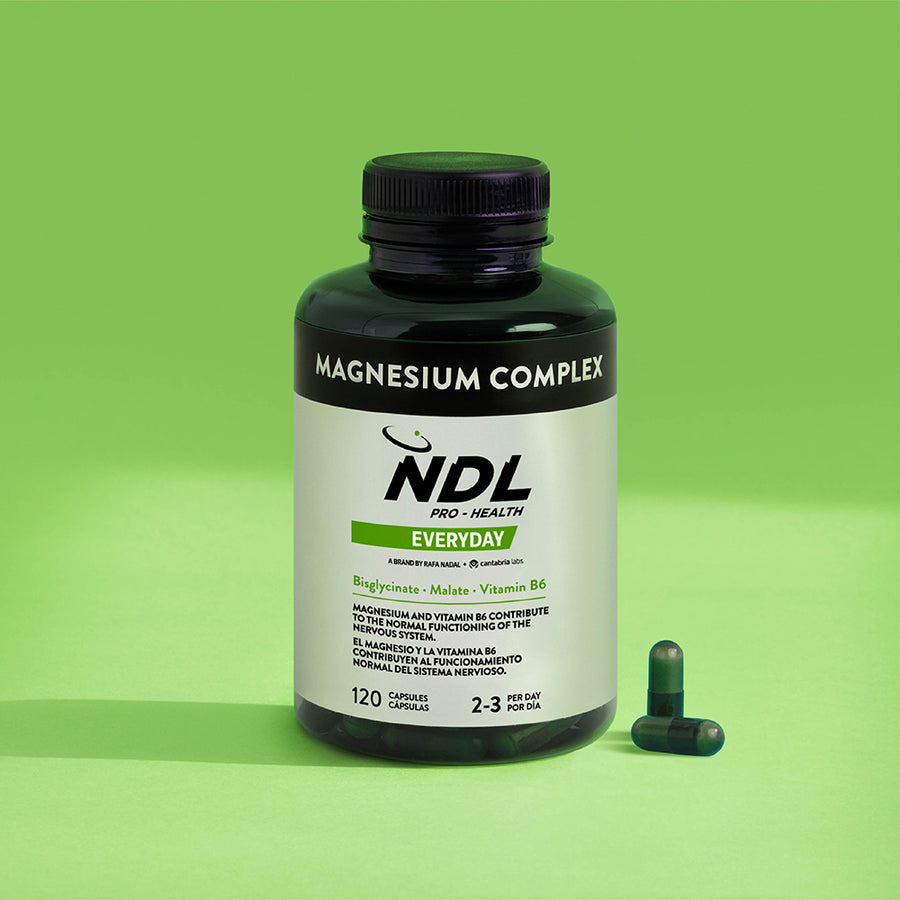Featured Products

Triple Magnesium
See productMagnesium is one of the most essential minerals for the body, but also one of the easiest to become deficient in without noticing. It participates in more than 300 biochemical reactions related to energy, muscle function, nervous system balance and sleep quality. That’s why, when levels are low, it’s common to experience fatigue, cramps, high stress, or difficulty sleeping well.
Although many people know it’s important, few truly understand how much they need per day or the best time to take magnesium to get the maximum benefit. In fact, the right dose — and the timing — can make the difference between noticing results… or not.
In this article, you’ll find a complete and simple guide to understanding the recommended daily dose, the factors that increase your needs, the most effective forms of magnesium and when to take it depending on your goal.
What does magnesium do in your body?
Magnesium acts as an internal regulator that keeps many processes in balance so your body can function properly. One of its most important roles is its involvement in muscle contraction and relaxation, allowing muscles to respond normally both at rest and during movement.
It also plays a role in nerve impulse transmission, helping signals travel efficiently between cells and keeping nervous system activity stable.
In addition, magnesium is necessary to activate enzymes involved in protein synthesis, energy production and electrolyte balance, making it a key mineral for physical performance and post-exercise recovery. Its role in metabolism also influences functions such as glucose regulation and cardiovascular health.
When the body doesn’t receive enough magnesium, various signs may appear that are not always directly linked to this mineral: muscle stiffness, small involuntary contractions, loss of strength, unusual tiredness, increased stress sensitivity or difficulties maintaining proper nervous system regulation. Although many of these signals are subtle, they often indicate that the body needs a higher intake to maintain internal balance.
How much magnesium do you need per day?
Daily magnesium needs vary depending on age, sex and lifestyle, but for adults they generally fall between 250 and 400 mg of elemental magnesium per day. This amount supports basic body functions and helps maintain adequate levels in tissues and internal stores. However, factors such as ongoing stress, intense exercise, a diet low in vegetables, nuts or legumes, or certain digestive conditions can increase your requirements.

It’s common for actual intake to be lower than recommended, as many foods today contain less magnesium due to farming and refining processes. For this reason, some people may need an extra supplement to reach optimal levels, especially if they experience symptoms such as muscle tension, fatigue or difficulty relaxing.
Even so, it’s important not to exceed the recommended daily dose and to consider individual tolerance, since the body absorbs moderate amounts spread throughout the day better than very high single doses.
Which type of magnesium should you choose and why does it matter?
Not all magnesium supplements are absorbed the same or act in the same way in the body. The most common forms — such as bisglycinate, citrate or malate — differ in their bioavailability and the types of benefits they provide.
Bisglycinate is considered one of the gentlest and easiest forms to absorb, ideal for those looking to improve relaxation, sleep quality or reduce muscle tension.
Citrate stands out for its good absorption and usefulness for muscle function and energy metabolism. Malate, on the other hand, is more associated with performance and vitality, as it directly participates in energy-production cycles.
Some formulations also combine these forms to provide a more complete and balanced effect, adding nutrients such as vitamin B6 or vitamin D, which help optimize the use of magnesium in the body.
When choosing a supplement, it’s important to look at the amount of elemental magnesium provided per dose — not just the total weight of the compound — as well as its digestive tolerance. A good choice can make the difference between noticing real benefits or not achieving the expected results.
What is the best time to take magnesium?
The ideal time to take magnesium largely depends on your goal. Many people take it in the afternoon or evening, as some forms — especially highly tolerated ones like bisglycinate — promote relaxation and may support more restorative sleep.
If your goal is to improve energy and muscle function, taking it in the morning or after exercise can be useful, as the body needs to replenish minerals and support the processes involved in energy production.
Taking it with food usually improves digestive tolerance, although some people absorb it well on an empty stomach. It’s also common to split the dose into two moments of the day to optimize absorption and avoid gastrointestinal discomfort, especially if the total intake is high.
The key is to maintain consistency: taking it at the same time every day helps the body use it more effectively and experience more stable benefits.
In conclusion, magnesium is essential for muscular, nervous and energy balance, and meeting the right daily dose can make a significant difference in how you feel each day. Choosing well-absorbed forms, adjusting your intake to your needs and taking it at the time of day that best aligns with your goals — whether boosting energy, promoting relaxation or supporting recovery — helps maximize its benefits.
Maintaining a regular intake and paying attention to your body’s signals is the simplest way to make the most of what magnesium offers. With the right dose, a good routine and a quality formulation, this mineral becomes a key ally for long-term wellbeing.

From the NDL Pro-Health team we will provide you with tips to maintain a healthy lifestyle. Sharing knowledge and product recommendations to offer optimal solutions for your daily routine, for your workouts and subsequent recovery, all with the goal of helping you achieve physical and mental wellness.

















